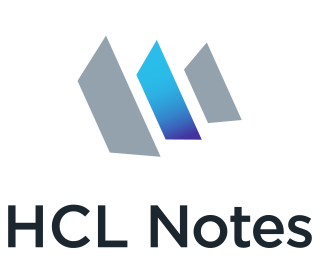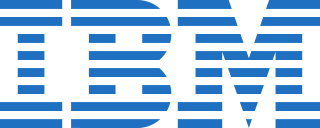
AIM was an instant messaging and presence computer program created by AOL, which used the proprietary OSCAR instant messaging protocol and the TOC protocol to allow registered users to communicate in real time.
ICQ was a cross-platform instant messaging (IM) and VoIP client. The name ICQ derives from the English phrase "I Seek You". Originally developed by the Israeli company Mirabilis in 1996, the client was bought by AOL in 1998, and then by Mail.Ru Group in 2010.

Instant messaging (IM) technology is a type of synchronous computer-mediated communication involving the immediate (real-time) transmission of messages between two or more parties over the Internet or another computer network. Originally involving simple text message exchanges, modern IM applications and services tend to also feature the exchange of multimedia, emojis, file transfer, VoIP, and video chat capabilities.

HCL Notes is a proprietary collaborative software platform for Unix (AIX), IBM i, Windows, Linux, and macOS, sold by HCLTech. The client application is called Notes while the server component is branded HCL Domino.

Online chat is any kind of communication over the Internet that offers a real-time transmission of text messages from sender to receiver. Chat messages are generally short in order to enable other participants to respond quickly. Thereby, a feeling similar to a spoken conversation is created, which distinguishes chatting from other text-based online communication forms such as Internet forums and email. Online chat may address point-to-point communications as well as multicast communications from one sender to many receivers and voice and video chat, or may be a feature of a web conferencing service.

Extensible Messaging and Presence Protocol is an open communication protocol designed for instant messaging (IM), presence information, and contact list maintenance. Based on XML, it enables the near-real-time exchange of structured data between two or more network entities. Designed to be extensible, the protocol offers a multitude of applications beyond traditional IM in the broader realm of message-oriented middleware, including signalling for VoIP, video, file transfer, gaming and other uses.
Social software, also known as social apps or social platform includes communications and interactive tools that are often based on the Internet. Communication tools typically handle capturing, storing and presenting communication, usually written but increasingly including audio and video as well. Interactive tools handle mediated interactions between a pair or group of users. They focus on establishing and maintaining a connection among users, facilitating the mechanics of conversation and talk. Social software generally refers to software that makes collaborative behaviour, the organisation and moulding of communities, self-expression, social interaction and feedback possible for individuals. Another element of the existing definition of social software is that it allows for the structured mediation of opinion between people, in a centralized or self-regulating manner. The most improved area for social software is that Web 2.0 applications can all promote co-operation between people and the creation of online communities more than ever before. The opportunities offered by social software are instant connections and opportunities to learn. An additional defining feature of social software is that apart from interaction and collaboration, it aggregates the collective behaviour of its users, allowing not only crowds to learn from an individual but individuals to learn from the crowds as well. Hence, the interactions enabled by social software can be one-to-one, one-to-many, or many-to-many.

Prodigy Communications Corporation was an online service from 1984 to 2001 that offered its subscribers access to a broad range of networked services. It was one of the major internet service providers of the 1990s.
HCL Sametime Premium is a client–server application and middleware platform that provides real-time, unified communications and collaboration for enterprises. Those capabilities include presence information, enterprise instant messaging, web conferencing, community collaboration, and telephony capabilities and integration. Currently it is developed and sold by HCL Software, a division of Indian company HCL Technologies, until 2019 by the Lotus Software division of IBM.
Digital reference is a service by which a library reference service is conducted online, and the reference transaction is a computer-mediated communication. It is the remote, computer-mediated delivery of reference information provided by library professionals to users who cannot access or do not want face-to-face communication. Virtual reference service is most often an extension of a library's existing reference service program. The word "reference" in this context refers to the task of providing assistance to library users in finding information, answering questions, and otherwise fulfilling users’ information needs. Reference work often but not always involves using reference works, such as dictionaries, encyclopedias, etc. This form of reference work expands reference services from the physical reference desk to a "virtual" reference desk where the patron could be writing from home, work or a variety of other locations.

Skype for Business Server is real-time communications server software that provides the infrastructure for enterprise instant messaging, presence, VoIP, ad hoc and structured conferences and PSTN connectivity through a third-party gateway or SIP trunk. These features are available within an organization, between organizations and with external users on the public internet or standard phones.

IBM is a globally integrated enterprise operating in 170 countries. IBM's R&D history in Israel began in 1972 when Professor Josef Raviv established the IBM Israel Scientific Center in the Technion's Computer Science Building in Haifa. As of 2023, over 3000 individuals work at IBM R&D locations across Israel, including Haifa, Tel Aviv, Herzliya, Rehovot, and the Jerusalem Technology Park.
IBM Workplace is a discontinued brand of collaborative software applications from IBM's Lotus Software division. It was intended to be the next generation of collaboration software that would work with IBM's Java EE-based WebSphere Portal server software. Introduced in 2003, the brand was largely disbanded by 2007, with its core technologies and many of its products rebranded as Lotus or WebSphere.
HCL iNotes offers a full-featured web-based version of HCL Technologies's HCL Notes client. Formerly known as IBM Lotus Domino Web Access, HCL iNotes provides HCL Notes users with browser-based access to their HCL Notes mail, calendar, and contacts. The software combines with HCL Domino software to provide a client interface that is available both online and offline. It provides access to collaboration tools using a variety of Web browsers across multiple platforms.

Thomson Reuters Messenger is an instant messaging tool and real-time collaboration service commonly used by financial professionals. It was initially released by Reuters in November 2002. On April 17, 2008, Thomson Reuters purchased Reuters Group and acquired this service. The most recent version of it is Thomson Reuters Messenger 8.4, which was released on March 31, 2011.
IBM Lotus QuickPlace is a proprietary Web-based collaborative software application distributed by the Lotus Software division of IBM. Lotus QuickPlace is a self-service Web tool that provides non-technical professionals the ability to easily create a browser-accessible workspace to support a task, project, or initiative. QuickPlace also integrates with IBM Lotus Sametime providing presence awareness of other users online and available for conferencing.
Unified communications (UC) is a business and marketing concept describing the integration of enterprise communication services such as instant messaging (chat), presence information, voice, mobility features, audio, web & video conferencing, fixed-mobile convergence (FMC), desktop sharing, data sharing, call control and speech recognition with non-real-time communication services such as unified messaging. UC is not necessarily a single product, but a set of products that provides a consistent unified user interface and user experience across multiple devices and media types.

IBM SmartCloud for Social Business is a suite of business networking and collaboration cloud-based services hosted by the IBM Collaboration Solutions division of IBM. The integrated services that are covered by this software are social networking for businesses, online meetings, file sharing, instant messaging, data visualization, and e-mail.
WebSphere Portal is an enterprise software used to build and manage web portals. It provides access to web content and applications, while delivering personalized experiences for users.

Actiance Inc. was an American-based multinational corporation that developed platforms required to enable security, management, and compliance of unified communications, Web 2.0, and social media channels. Headquartered in Redwood City, California, Actiance supported social networks, unified communications providers and Instant Messaging platforms, including Facebook, LinkedIn, Twitter, AOL, Google, Yahoo!, Skype, Microsoft, IBM and Cisco.









